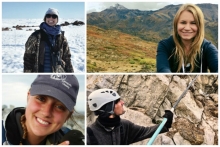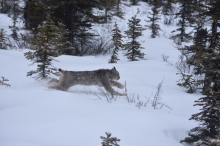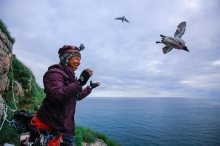On October 8th, the Fonds de recherche du Québec - Nature et technologies (FRQNT), along with its partner the ministère de l'Agriculture, des Pêcheries et de l'Alimentation (MAPAQ) announced the creation of the Réseau québécois de recherche en agriculture durable (RQRAD), a flagship measure of the Plan d’agriculture durable 2020-2030 (PAD).

Today, the Fonds de recherche du Québec - Nature et technologies (FRQNT), along with its partner the ministère de l'Agriculture, des Pêcheries et de l'Alimentation (MAPAQ) announced the creation of the Réseau québécois de recherche en agriculture durable (RQRAD), a flagship measure of the Plan d’agriculture durable 2020-2030 (PAD).
During the last year and a half, the world’s attention has been focused squarely on SARS-CoV-2, the coronavirus that causes COVID-19. While deadly, this virus is only one of many pathogens that threaten our well-being. For many years, scientists have been warning about another microscopic menace: drug-resistant microbes.

Congrats to Elena Bennett (NRS/BSE), one of sixteen Canadian sustainability leaders (#Clean16 honourees) named to the Delta Management Group’s 2022 Clean50 list.
A study released this month found that as the climate changes in the North, some cold-adapted arctic birds are especially susceptible to heat stress.

Prestigious awards provide support to young scientists in Canada pursuing research in Canada’s North

The Arctic is warming at approximately twice the global rate. A new study led by researchers from McGill University finds that cold-adapted Arctic species, like the thick-billed murre, are especially vulnerable to heat stress caused by climate change.
“We discovered that murres have the lowest cooling efficiency ever reported in birds, which means they have an extremely poor ability to dissipate or lose heat,” says lead author Emily Choy, a Postdoctoral Fellow in the Natural Resource Sciences Department at McGill University.

Congratulations to Pierre G. Langlois, B.Sc. (Agr)'78, CBIS (MIS)'90, the first of several members of the Macdonald community to be named an Unsung Hero as part of the University’s Bicentennial Celebrations!
Pierre lives the Macdonald motto “Mastery for Service.” Over the years, he has dedicated much of his time and energy to representing the interests of others and bettering the units and communities he serves.

Using a Fitbit and a spy mic, scientists have discovered new insight into the behaviour of the elusive Canada lynx. A new study by researchers from McGill University, University of Alberta, and Trent University provides a first look at how miniaturized technology can open the door to remote wildlife monitoring.
Many Canadians are familiar with the honking and hissing that marks the beginning of the spring season, some might be more intimately familiar with the feeling of large wings batting about the sides of their head, but one thing is for certain: most Canadians have a Canada goose story.
Canada geese flying in their V formation are usually one of the first signs of the return of warm weather, but it also marks the return of the pesky waterfowl taking over our waterfronts, golf courses and parks. Here’s what you should know about the birds that have become a national symbol.

'Eco-accounting' project aims to produce a comprehensive tally of our natural landscapes, to better aid decision-making around land management
The bean counters have arrived and Elena Bennett [Natural Resource Sciences] could not be happier.

“Our research shows that climate change is having substantial impacts on Arctic ecosystems, with consequences for exposure to toxic pollutants like mercury,” says co-author Jean-Pierre Desforges, a Postdoctoral Fellow [NRS] at McGill University under the supervision of Nil Basu [NRS/SHN] and Melissa McKinney [NRS].

Water scarcity in rural Alaska is not a new problem, but the situation is getting worse with climate change. Lasting solutions must encourage the use of alternative water supplies like rainwater catchment and grey water recycling.

In the Arctic, climate change and pollution are the biggest threats to top predators like narwhals. Studying the animals’ tusks reveals that diet and exposure to pollution have shifted over the past half century in response to sea-ice decline. Human emissions have also led to a sharp rise in the presence of mercury in recent years, according to an international team of researchers.

Emily Choy [Post Doctoral Fellow, NRS. Advisor : Kyle Elliott] became hooked on the Arctic when, as a Master’s student, she jumped on a research opportunity to study the effects of manmade contaminants on High Arctic food webs on Devon Island, Nunavut. “When I experienced how out of the world it was and observed the wildlife that are so highly adapted to the Arctic environment, I just fell in love,” says Choy.
